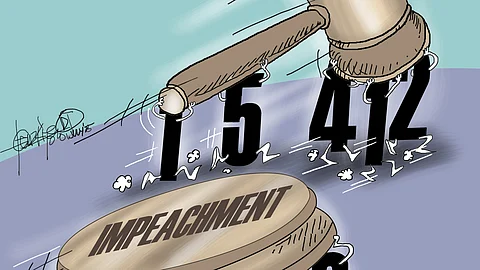
- NEWS
- the EDIT
- COMMENTARY
- BUSINESS
- LIFE
- SHOW
- ACTION
- GLOBAL GOALS
- SNAPS
- DYARYO TIRADA
- MORE

Ultimately, it will be a game of numbers.
The debate over the Senate court’s power to throw out the articles of impeachment has been simmering, with heated reactions from those who consider the move to oust Vice President Sara Duterte to be unjustified.
The noise became louder after Senate President Chiz Escudero, the presiding officer, stated that he cannot stop attempts initiated by senator-judges to kill the impeachment complaint.
Senator Ronald “Bato” dela Rosa had moved in the plenary for the dismissal of the Articles of Impeachment, but this was eventually amended to a move to remand the articles of impeachment to the House of Representatives.
In brief, the tribunal does not have the authority to prohibit a motion, as this is not found in any of the rules or the Constitution. “You can’t just arbitrarily stop it,” Escudero laid down the cards.
What he said, however, was not a partial statement, as it was merely a forthright description of the situation.
The Senate court, described as sui generis, remains a collegial body that votes on motions and objections.
“We vote on it. The only time a simple majority is not required is when we decide whether to convict or acquit the impeachable official, which would require a two-thirds vote,” Escudero said.
That’s the ultimate vote, which became a historic turning point during the conviction of Supreme Court Chief Justice Renato Corona — the only such process to be completed.
Initiated in 2011 and culminating in 2012, the Corona trial marked a pivotal moment, reflecting deep-seated tensions between the judiciary and the executive, as well as issues of transparency and allegations of political motivations.
On 29 May 2012, the Senate voted 20-3 to convict Corona on Article 2, or failure to disclose his Statement of Assets, Liabilities and Networth (SALN).
The number exceeded the two-thirds majority of 16 votes required for conviction. The senators who voted to acquit were Joker Arroyo, Miriam Defensor-Santiago and Ferdinand Marcos Jr.
The historic process was marred by allegations of executive interference, “financial incentives,” and had the markings of a personal vendetta over the Hacienda Luisita case.
Subsequent legal rulings, such as the dismissal of the forfeiture case and the granting of benefits to Corona’s family, suggested that the late Supreme Court head was a victim of political persecution.
Now we have another politically charged impeachment process in the offing.
Escudero said the other side of the coin would be a petition to convict Duterte immediately, even without a trial, which is also within the realm of possibilities.
The lawyers of the Vice President can file a motion to dismiss once the impeachment trial is convened, based on their ad cautelam position, which states that the complaint violates the constitutional ban on filing multiple impeachment cases in one year.
“Someone could also make a motion to convict her outright, and I cannot prevent that from happening. So don’t just focus on the motion to dismiss. Because a motion to convict [outright] can also be made,” Escudero said.
The long and short of it is that the impeachment trial is a political process that will be decided by the tyranny of numbers.
